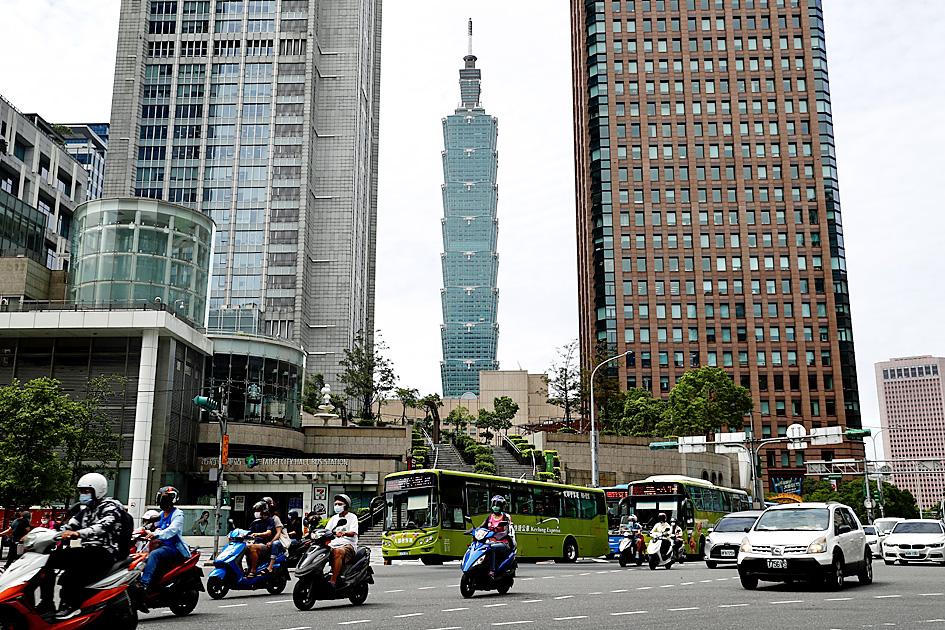Taiwan remained the fifth-largest net creditor in the world at the end of last year as the nation’s net international investment position (NIIP) reached a new high, the central bank said on Tuesday.
NIIP is the difference between a country’s external financial assets and its external financial liabilities.
At the end of last year, Taiwan’s external assets totaled US$2.492 trillion and its external liability was US$1.121 trillion.

Photo: Ritchie B. Tongo, EPA-EFE
These figures meant that Taiwan’s NIIP reached a record of US$1.371 trillion, up US$23.25 billion — or 1.7 percent — from a year earlier, the bank said.
External liability includes government and private debt, with external assets held by public entities and legal residents also taken into account for NIIP calculations.
The bank said that Taiwan’s NIIP trailed Japan’s US$3.7210 trillion, Germany’s US$3.1280 trillion, Hong Kong’s US$2.1528 trillion and China’s US$2.1503 trillion.
Hong Kong rose one notch in the rankings, replacing China as the third-largest net creditor worldwide as the territory’s assets rose and liability fell, the central bank said.
Taiwan’s net assets at the end of last year rose 10.5 percent from a year earlier, with life insurance companies holding more foreign securities, the bank said.
Taiwan’s net liability rose 23.5 percent, as the value of securities held by foreign investors expanded significantly, it said.
Last year, the TAIEX soared 22.8 percent from a year earlier, largely driven by ample liquidity, despite the COVID-19 pandemic, it said.
In addition to a high-flying equity market, the expanded external liability also resulted from an improved bond market, further pushing up the value of assets held by foreign investors, it said.
The US remained the largest net debtor in the world at the end of last year, with external liabilities hitting a new high of more than US$14 trillion, the central bank said.

South Korea’s equity benchmark yesterday crossed a new milestone just a month after surpassing the once-unthinkable 5,000 mark as surging global memory demand powers the country’s biggest chipmakers. The KOSPI advanced as much as 2.6 percent to a record 6,123, with Samsung Electronics Co and SK Hynix Inc each gaining more than 2 percent. With the benchmark now up 45 percent this year, South Korea’s stock market capitalization has also moved past France’s, following last month’s overtaking of Germany’s. Long overlooked by foreign funds, despite being undervalued, South Korean stocks have now emerged as clear winners in the global market. The so-called “artificial intelligence

Chinese artificial intelligence (AI) start-up DeepSeek’s (深度求索) latest AI model, set to be released as soon as next week, was trained on Nvidia Corp’s most advanced AI chip, the Blackwell, a senior official of US President Donald Trump’s administration said on Monday, in what could represent a violation of US export controls. The US believes DeepSeek will remove the technical indicators that might reveal its use of American AI chips, the official said, adding that the Blackwells are likely clustered at its data center in Inner Mongolia, an autonomous region of China. The person declined to say how the US government received

‘SEISMIC SHIFT’: The researcher forecast there would be about 1.1 billion mobile shipments this year, down from 1.26 billion the prior year and erasing years of gains The global smartphone market is expected to contract 12.9 percent this year due to the unprecedented memorychip shortage, marking “a crisis like no other,” researcher International Data Corp (IDC) said. The new forecast, a dramatic revision down from earlier estimates, gives the latest accounting of the ongoing memory crunch that is affecting every corner of the electronics industry. The demand for advanced memory to power artificial intelligence (AI) tasks has drained global supply until well into next year and jeopardizes the business model of many smartphone makers. IDC forecast about 1.1 billion mobile shipments this year, down from 1.26 billion the prior

FORTUNES REVERSED: The new 15 percent levies left countries with a 10 percent tariff worse off and stripped away the advantage of those with a 15 percent rate In a swift reversal of fortunes, countries that had been hardest hit by US President Donald Trump’s tariffs have emerged as the biggest winners from the US Supreme Court’s decision to strike down his emergency levies. China, India and Brazil are among those now seeing lower tariff rates for shipments to the US after the court ruled Trump’s use of the International Emergency Economic Powers Act to impose duties was illegal. While Trump subsequently announced plans for a 15 percent global rate, Bloomberg Economics said that would mean an average effective tariff rate of about 12 percent — the lowest since